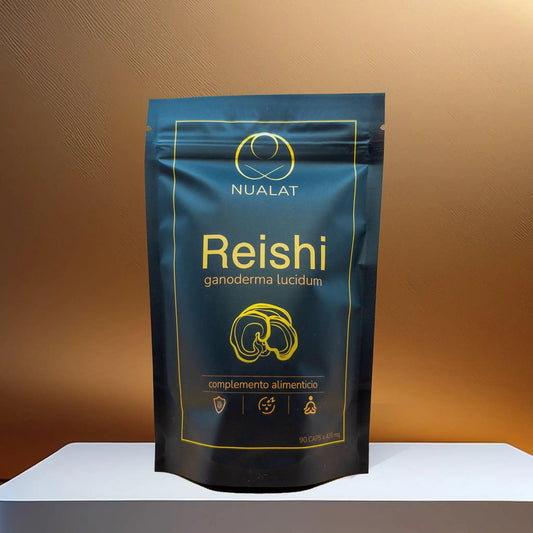
Medicinal Mushrooms and the Immune System: Scientific Evidence and Benefits
Share
Medicinal Mushrooms: The Science Behind Their Impact on the Immune System
The relationship between diet and health has been studied for centuries, but in recent years, medicinal mushrooms have gained special attention due to their potential to naturally modulate the immune system. A recent study published in Fungi Journal by Zhao et al. (2020) titled “Immunomodulatory Effects of Edible and Medicinal Mushrooms and Their Bioactive Immunoregulatory Products” , takes an in-depth look at the mechanisms by which bioactive compounds in mushrooms can strengthen the immune response and improve overall health.
In this article we will explore the key findings of the study and how these discoveries can be integrated into a science-based approach to health.
What Are Medicinal Mushrooms?
Medicinal mushrooms are a group of fungal species that have been used for therapeutic purposes for centuries in various cultures. Some of the most studied include Ganoderma lucidum (reishi), Lentinula edodes (shiitake), Grifola frondosa (maitake), Inonotus obliquus (chaga) and Trametes versicolor (turkey tail).
Unlike synthetic drugs, medicinal mushrooms contain a unique combination of polysaccharides, proteins, terpenes and other secondary metabolites that can act synergistically in the body.
Bioactive Compounds and Their Role in the Immune System
According to Zhao et al. (2020), medicinal mushrooms contain various immunomodulatory compounds that can be classified into three main categories:
1️⃣ Polysaccharides and Glucans
β-glucans are the most studied immunomodulatory compounds in fungi. They are found in the cell wall of many species and have been shown to be able to activate macrophages, dendritic cells and natural killer (NK) cells, which are essential in the innate immune response.
One of the best-known examples is lentinan, a β-glucan extracted from shiitake, which has been used in Japan as an adjuvant in cancer therapies due to its ability to stimulate the production of cytokines such as IL-2 and TNF-α.
2️⃣ Immunomodulatory Proteins (FIPs) and Lectins
Fungal immunomodulatory proteins (FIPs) have gained interest for their ability to modulate immune system gene expression. FIP-gts, isolated from Ganoderma tsugae , for example, has been shown to induce the production of interferon gamma (IFN-γ), a key cytokine in the defense against intracellular pathogens.
On the other hand, lectins from fungi such as Schizophyllum commune can stimulate the maturation of dendritic cells and improve communication between innate and adaptive immunity.
3️⃣ Terpenes and Terpenoids
Terpenoids, especially triterpenes from Ganoderma lucidum , have shown anti-inflammatory and immunomodulatory effects. These compounds have been found to regulate the activation of nuclear factor NF-κB, a key regulator of inflammation and immune response.
Mechanisms of Action: How Do They Work in the Body?
Zhao et al. (2020) describe several ways in which medicinal mushrooms interact with the immune system:
🔬 Activation of Toll-Like Receptors (TLRs) : Some mushroom compounds can bind to receptors on immune cells, promoting the release of pro-inflammatory cytokines and stimulating an effective immune response.
🦠 Increased NK Cell Cytotoxicity : Natural killer (NK) cells play a key role in eliminating tumor cells and viruses. β-glucans can increase their activity, making the immune system more efficient at detecting and eliminating threats.
🧬 Modulation of Gene Expression : Some compounds in mushrooms can influence the expression of genes related to the immune response, helping to balance inflammation and cell regeneration.
Medicinal Mushrooms and Human Health: What Does the Evidence Say?
The study by Zhao et al. (2020) highlights that medicinal mushrooms can be powerful allies in various areas of health:
🛡 Cancer Prevention and Treatment : They have been used in clinical trials as adjuvants in oncological therapies due to their ability to stimulate the immune system without severe adverse effects.
💪 Immune System Booster : Supplementing with mushroom extracts can help improve the response to viral and bacterial infections.
🧠 Neuroprotection and Stress Regulation : Hericium erinaceus (lion's mane) has been studied for its effect on the nervous system and its ability to stimulate neuronal regeneration.
How to Integrate Medicinal Mushrooms into a Healthy Routine?
While these findings are promising, it is important to remember that medicinal mushrooms do not replace conventional medical treatments, but can be used as part of a comprehensive health approach. Some forms of consumption include:
🍵 Infusions and Mushroom Tea : Chaga and reishi are popular in tea form due to their concentration of antioxidants and polysaccharides.
🧴 Extracts and Tinctures : They can be found in drops or capsules for more efficient absorption of their bioactive compounds.
🥗 Mushroom Powder in Food : Can be added to smoothies, soups and stews for a nutritional boost.
Conclusion: Science Backs Medicinal Mushrooms
The study by Zhao et al. (2020) confirms that medicinal mushrooms have a solid scientific basis as natural immunomodulators. With a favorable safety profile and a history of millennia-old use, their integration into the daily diet could offer substantial health benefits.
At NUALAT we believe in the importance of science as a guide to a healthier and more conscious life. If you are interested in exploring the benefits of medicinal mushrooms, we invite you to discover our high-quality products, backed by scientific evidence.
📚 Reference :
Zhao, S., Gao, Q., Rong, C., Wang, S., Zhao, Z., Liu, Y., & Xu, J. (2020). Immunomodulatory Effects of Edible and Medicinal Mushrooms and Their Bioactive Immunoregulatory Products . Fungi Journal , 6(4), 269.






